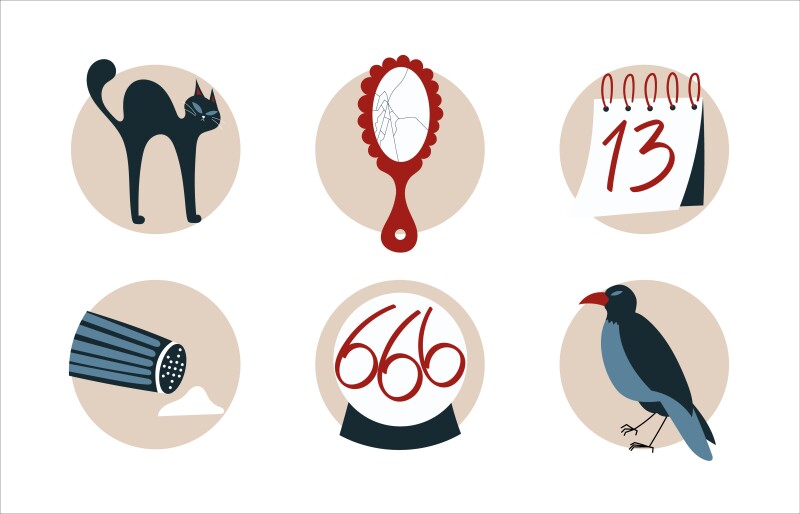Lifestyle
Unraveling Superstitions: Origins of Bad Luck Beliefs

Superstitions surrounding bad luck have deep roots in mythology, religion, and cultural practices. Common beliefs, such as associating black cats, the date of Friday the 13th, and broken mirrors with misfortune, reveal how historical events and societal fears have shaped collective consciousness. Understanding these origins not only sheds light on human psychology but also reveals the diversity of beliefs across cultures.
Black Cats: From Demonic Companions to Cultural Symbols
The notion that black cats bring bad luck can be traced back to Europe during the Middle Ages. Cats, particularly black ones, became linked to witchcraft, as many believed they were companions of witches. According to research from Mount St. Joseph University, a papal decree issued in 1233 by Pope Gregory IX intensified fears surrounding black cats, associating them with heretical rituals. This fear was further amplified during the witch hunts of the era, leading to a lasting superstition that crossed the Atlantic with early settlers.
Interestingly, not all cultures view black cats negatively. In ancient Egypt, they were revered and associated with the goddess Bastet. In Japan, a black cat crossing a woman’s path is seen as a sign of good fortune in love. Moreover, sailors historically regarded black cats on their ships as harbingers of a safe voyage.
Friday the 13th: A Day of Doom
The superstition surrounding Friday the 13th is rooted in a mix of religious, historical, and mythological narratives. In Christian tradition, the Last Supper included thirteen guests, with Judas—believed to have betrayed Jesus—being the thirteenth. Additionally, Jesus was crucified on a Friday, compounding the negative associations with this day, as noted by the Library of Congress Blogs.
Historical events have further solidified this superstition. On October 13, 1307, King Philip IV of France ordered the mass arrest and execution of the Knights Templar, an event that has left a lasting mark on the perception of Friday the 13th as an unlucky day. Norse mythology also contributes to this belief, with the god Loki being considered the uninvited thirteenth guest at a dinner, leading to the downfall of the god Balder.
The number 13 has long been deemed unlucky, as it follows the “perfect” number 12, often associated with completion, such as the twelve months in a year or the twelve zodiac signs.
Broken Mirrors: Soul and Misfortune
The superstition regarding broken mirrors has its origins in ancient Roman beliefs. Romans held that a mirror reflected a person’s soul and that breaking one would damage the soul itself. The University of South Carolina indicates that Romans believed it took seven years for the body and soul to regenerate. Consequently, breaking a mirror was thought to result in seven years of bad luck until the soul could heal and renew.
Over time, various remedies have emerged to counteract the misfortune associated with breaking a mirror. Some suggest grinding the glass to dust, burying the pieces, or throwing them into a stream flowing south, reflecting the desire to mitigate the perceived consequences of misfortune.
Mirrors Facing Each Other: Ghost Portals?
One particularly eerie superstition involves two mirrors facing each other, which some believe creates a “ghost portal.” This idea stems from the notion that mirrors can create infinite reflections that might trap spirits or serve as gateways for paranormal entities. Mirrors are often considered “liminal” spaces, lying between our world and another, facilitating the crossing of spirits into our reality.
Some cultural interpretations even suggest that this arrangement could provide a passage for negative forces or confused spirits. There are variations of this myth that contend spirits may become trapped between the mirrors, potentially haunting the surrounding space.
Superstitions like these reflect humanity’s deep-seated fears and beliefs, often arising from historical contexts and cultural narratives. As societies evolve, so too do the interpretations and significance of these ancient beliefs. Understanding their origins offers a glimpse into the complexities of human thought and cultural diversity.
Do you find yourself influenced by these superstitions, or are there other beliefs that resonate more closely with your experiences?
-

 Science4 weeks ago
Science4 weeks agoALMA Discovers Companion Orbiting Giant Red Star π 1 Gruis
-

 Top Stories2 months ago
Top Stories2 months agoNew ‘Star Trek: Voyager’ Game Demo Released, Players Test Limits
-

 Politics2 months ago
Politics2 months agoSEVENTEEN’s Mingyu Faces Backlash Over Alcohol Incident at Concert
-

 World2 months ago
World2 months agoGlobal Air Forces Ranked by Annual Defense Budgets in 2025
-

 World2 months ago
World2 months agoMass Production of F-35 Fighter Jet Drives Down Costs
-

 World2 months ago
World2 months agoElectrification Challenges Demand Advanced Multiphysics Modeling
-

 Business2 months ago
Business2 months agoGold Investment Surge: Top Mutual Funds and ETF Alternatives
-

 Science2 months ago
Science2 months agoTime Crystals Revolutionize Quantum Computing Potential
-

 Top Stories2 months ago
Top Stories2 months agoDirecTV to Launch AI-Driven Ads with User Likenesses in 2026
-

 Entertainment2 months ago
Entertainment2 months agoFreeport Art Gallery Transforms Waste into Creative Masterpieces
-

 Business2 months ago
Business2 months agoUS Government Denies Coal Lease Bid, Impacting Industry Revival Efforts
-

 Health2 months ago
Health2 months agoGavin Newsom Critiques Trump’s Health and National Guard Plans









